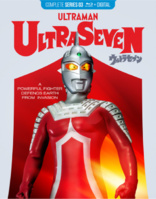Ultraseven: The Complete Series Blu-ray Movie
HomeUltraseven: The Complete Series Blu-ray Movie 
ウルトラセブン / Blu-ray + Digital CopyMill Creek Entertainment | 1967-1968 | 1208 min | Not rated | Dec 10, 2019
Movie rating
7.3 | / 10 |
Blu-ray rating
| Users | 3.0 | |
| Reviewer | 2.5 | |
| Overall | 2.6 |
Overview
Ultraseven: The Complete Series (1967-1968)
Starring: Kohji Moritsugu, Bin Furuya, Yuriko Hishimi, SandayŻ Dokumamushi, ShŰji NakayamaNarrator: Hikaru Urano
Director: Kazuho Mitsuta, Samaji Nonagase, Toshitsugu Suzuki, Hajime Tsuburaya, Akio JissŰji
| Foreign | Uncertain |
| Sci-Fi | Uncertain |
| Action | Uncertain |
| Fantasy | Uncertain |
| Supernatural | Uncertain |
| Adventure | Uncertain |
Specifications
Video
Video codec: MPEG-4 AVC
Video resolution: 1080p
Aspect ratio: 1.33:1
Original aspect ratio: 1.33:1
Audio
Japanese: DTS-HD Master Audio 2.0
Subtitles
English
Discs
Blu-ray Disc
Six-disc set (6 BDs)
Digital copy
Packaging
Slipcover in original pressing
Playback
Region free
Review
Rating summary
| Movie | 4.0 | |
| Video | 3.5 | |
| Audio | 3.0 | |
| Extras | 0.0 | |
| Overall | 2.5 |
Ultraseven: The Complete Series Blu-ray Movie Review
Reviewed by Martin Liebman January 5, 2020Note: some of what appears below are summations from the booklet included with this Blu-ray release, written by Keith Aiken.
Special effects wizard Eiji Tsuburaya was at one point best known for his work on some of Japan's most popular Kaiju films -- Toho's Godzilla and Mothra -- but it may be for the Ultra franchise for which he
will ultimately be remembered. In 1963 Tsuburaya founded Tsuburaya Productions, a then small house with the goal of crafting small
screen entertainment with big screen quality. Tsuburaya's first production, Ultra Q, was a monster success (in more ways than one). A follow-up
was quickly ordered. That follow-up: Ultraman, another massive hit for Tsuburaya and the first of numerous
television and cinema Ultra
Q spin-offs that has since gained the franchise recognition in the Guinness Book of World Records for its sprawling longevity.
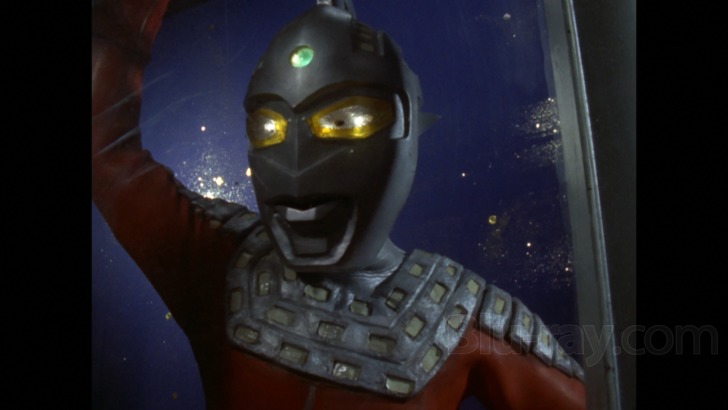
That longevity produced dozens of additional shows over the decades to come, and next in line was Ultraseven, Tsuburaya Productions' third installment which aired on TBS (Tokyo Broadcasting System) from October 1967 through September 1968, spanning 49 episodes and introducing a new hero, Ultra Seven, to battle a recurring alien threat. The series holds firm to the basic premise established in Ultraman, a premise that would carry on through for the production's sprawling history: Earth (Japan) finds itself under regular alien threat. A human-based resistance group, in this show The Terrestrial Defense Force's "ace" team Ultra Guard, operating out of a underground secret base filled with the latest in scientific equipment and weaponry, is formed to counter the attacks. Team members include Captain Kiriyama (Shōji Nakayama), Soga (Shinsuke Achiha), Furuhashi (Sandayū Dokumamushi), Amagi (Bin Furuya), and Anne (Yuriko Hishimi). Joining the group is the mysterious Dan Moroboshi who is actually an alien in disguise but rather than a threat he's a hero who transforms into Ultra Seven via the Ultra Eye.
While broadly familiar and kin to Ultraman, Ultraseven shifts focus and formula just enough to differentiate itself beyond basics. The title character is not a warrior but rather a scientist. Gone is the giant Ultra's inhabitation of another human, replaced with Seven's own transformation into Dan Moroboshi, who is not always portrayed as the quintessential hero, either in human or Ultra form. The character does away with the famous color timer, which series lore states is reserved for warriors, not scientists. The alterations keep the series feeling fresh while the core conflicts and episode structures ring familiar enough to hold established fans and build upon the formula and franchise rather than reboot it entirely. The result is a fun show that adheres to structure but forges its own identity through zippy episodes that are strict in structure but agreeable even through the wash-rinse-repeat cycle.
Ultraseven clearly benefits from Tsuburaya Productions' experiences with the previous two shows. It feels a bit more polished and a little more involved, adhering to formula but finding ways to expand content and characters and give the show a more complete feeling while still falling into a relative comfort zone. Characters are given more latitude for development and of the original three shows Dan Moroboshi is arguably the most compelling and complete character yet, certainly assisted by the structural shift from symbiosis to a single individual living, essentially, a double life as man and hero. Structural polish extends to the visual effects as well. While the show maintains the quintessential Ultra style, there's a consistently high quality blend of practical and visual effects and careful attention paid to Kaiju constructs and the wars that rage between the characters that tower over helpless miniatures. Ultraseven holds onto that unmistakable franchise charm and is usually strong enough in narrative context and core excitement to mask the various visual shortcomings that pale by today's standards but still work remarkably well for the five-decades-old show.
Ultraseven: The Complete Series Blu-ray Movie, Video Quality 
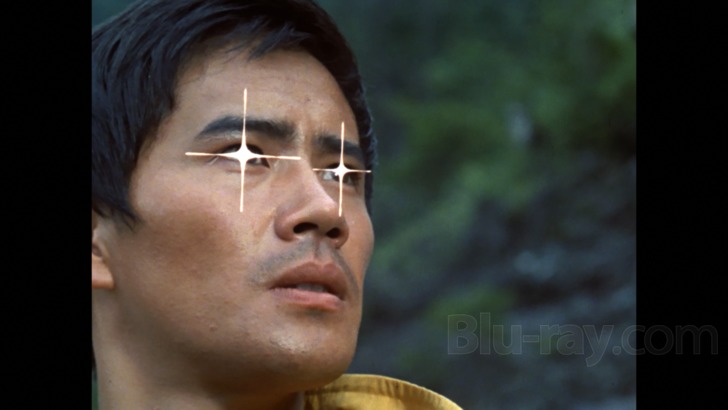
Ultraseven: The Complete Series makes its Blu-ray debut at a 1080p resolution framed at a 1.33:1 aspect ratio, preserving the original broadcast parameters and resulting in vertical "black bars" on both sides of the contemporary 1.78:1 display. The image maintains a fairly well manicured grain structure, though the picture is conversely often marred by usually subtle, but sometimes more plainly evident, compression artifacts. Occasional, but rarely intrusive, splotches and speckles also appear. Generally, the image is quite fluent and faithful, presenting a quality film-source presentation defined by high yield detail and capable color reproduction. Facial textures are crisp and satisfying both in close-up and at medium distance. Clothing is likewise sharp and nicely detailed, whether TDF uniforms or the Ultra Seven costume. Monsters also show structural components, whether biological or artificial, with impressive attention to detail and firm clarity. Environments are likewise clearly visible and stable, ranging from vintage computer clusters and other electronic instruments in TDF headquarters to natural formations out in the world. Miniatures remain plainly obvious but also nicely detailed. Colors enjoy capable balance and contrast. From Ultra Seven red to natural greens, the palette, while appearing slightly faded, rarely wants for a significant boost to tonal density or accuracy. Skin tones appear natural and black levels don't wander into overly pale territory. Though the image has a few issues, the overall presentation is not at all bad.
Ultraseven: The Complete Series Blu-ray Movie, Audio Quality 
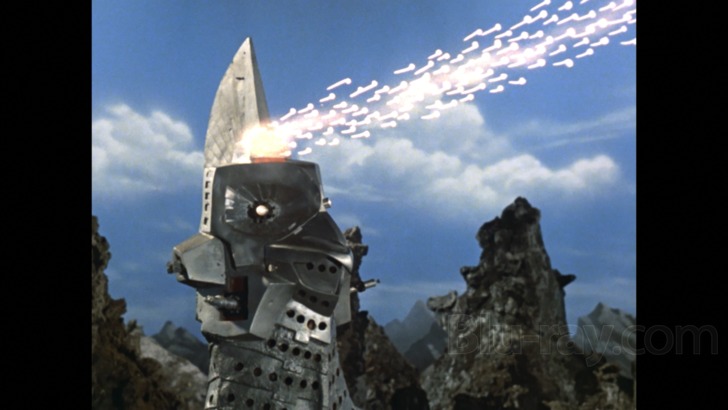
Ultraseven: The Complete Series features a single audio track: Japanese DTS-HD Master Audio 2.0. The presentation is not particularly dynamic, but spacing is excellent, with the opening title music spreading widely along the front. Lyrics settle further out to the sides rather than image to the center. Instrumental details are poor and the source shows its age both for quality and musical style, but it's baseline effective for reproducing the basics and is obviously far better than anything heard during the original broadcast run via lesser built-in TV speakers. General effects additionally lack more than core detail, and scratchiness and crunchiness are commonplace. Action explosions and laser beams -- the 15-minute mark of episode one when a human installation is devastated by aerial alien attack is a hearty, lengthy example -- offer plenty of information, spread, and aggression but not much lifelike clarity or range. An underlying hiss may be heard at times, subtle but evident, most noticeable during standard dialogue exchanges. The native language track centers well enough and presents with solid baseline verbal definition.
Ultraseven: The Complete Series Blu-ray Movie, Special Features and Extras 
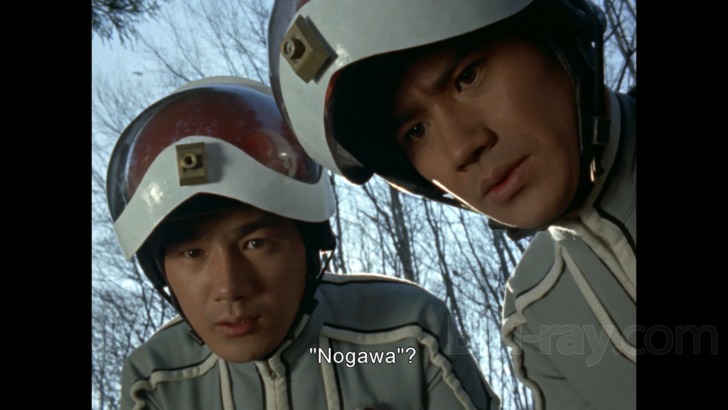
Ultraseven contains no supplements across any of the six discs. The main menu screens on each disc only offer the opportunity to toggle subtitles on and off in addition to selecting any of the disc's episodes, which are vertically oriented. The set does ship with an impressively assembled booklet that includes glossy pages, numerous black-and-white and color photographs, and plenty of text. It begins with introductory commentary on the show's history and production, a character breakdown, detailed episode synopses, key monster explorations, and a technology guide. Mill Creek has put together a comprehensive series breakdown in a relatively small space. While it's disappointing that there are no video-based extras, this compact handbook will prove to be a treasure for veterans and a necessity for newcomers just getting their feet wet in the universe. A MovieSpree digital copy code is also included with purchase.
Ultraseven: The Complete Series Blu-ray Movie, Overall Score and Recommendation 

Ultraseven is arguably the best and most complete of the original three franchise programs. Boasting the best visuals and the most engaging and intriguing lead, it's a terrific little escape that is at once both its own entity and a comfortable fit into the established Ultra universe. Mill Creek's Ultraseven: The Complete Series six-disc Blu-ray release may be featureless, but the included booklet serves up a healthy amount of content. Video and audio are imperfect but carry the material well enough. Highly recommended.
Other editions
Ultraseven: Other Seasons
Similar titles
Similar titles you might also like

Ultraman: The Complete Series
ウルトラマン
1966-1967

Ultra Q: The Complete Series
ウルトラQ
1966

Return of Ultraman
帰ってきたウルトラマン / Kaettekita Urutoraman
1971-1972

Ultraman Ace
ウルトラマンA(エース) / Urutoraman Ēsu
1972-1973

Ultraman Taro: The Complete Series
ウルトラマンタロウ
1973-1974

Ultraman Orb
Series + Movie / ウルトラマンオーブ & 劇場版 ウルトラマンオーブ 絆の力、おかりします!
2016-2017

Ultraman Geed
Series + Movie / ウルトラマンジード / Urutoraman JÓdo
2017-2018

Ultraman Leo: The Complete Series
1974-1975

Gamera: Super Monster
Uchu kaijŻ Gamera
1980

Terror of Mechagodzilla
メカゴジラの逆襲 / Mekagojira no gyakushu
1975

Godzilla vs. Megalon
ゴジラ対メガロ / Gojira tai Megaro
1973

Godzilla vs. Mechagodzilla
ゴジラ対メカゴジラ / Gojira tai Mekagojira
1974

Ultraman Orb: The Origin Saga
includes Ultra Fight Orb
2016-2017

Gamera vs. Viras
Gamera tai uchu kaijŻ Bairasu / Destroy All Planets
1968

Gamera vs. Guiron
Gamera tai daiakuju Giron
1969

Gamera vs. Zigra
Gamera tai Shinkai kaijŻ Jigura
1971

Godzilla vs. SpaceGodzilla
ゴジラvsスペースゴジラ / Gojira vs. Supesugojira
1994

Godzilla on Monster Island
地球攻撃命令 ゴジラ対ガイガン / ChikyŻ kogeki meirei: Gojira tai Gaigan / Godzilla vs. Gigan
1972

Invasion of Astro-Monster zero
1965

Godzilla: Final Wars
ゴジラ ファイナルウォーズ / Gojira: Fainaru uŰzu
2004
